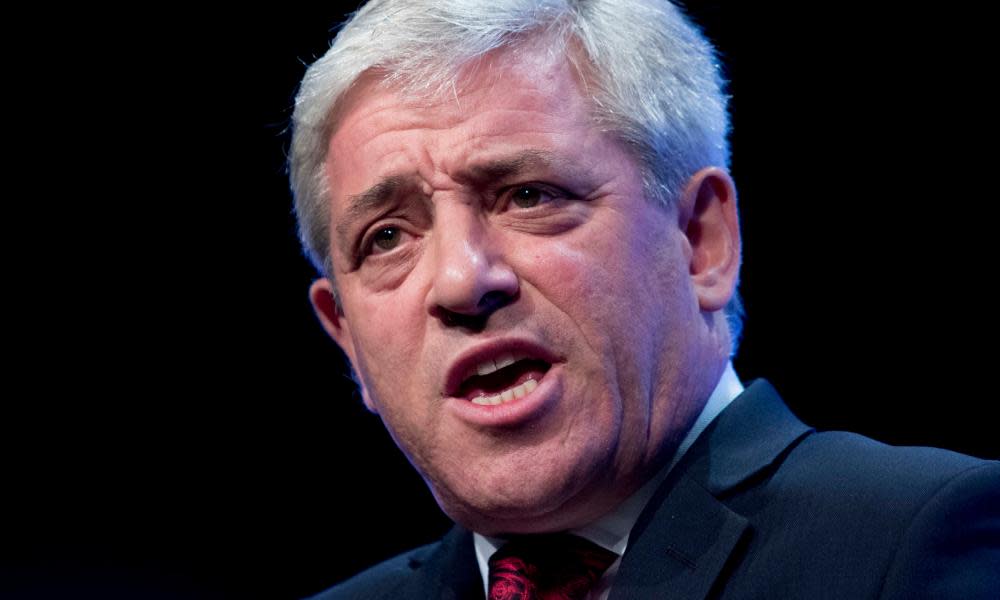Brexit amendment defeated after three others withdrawn

The only amendment to Theresa May’s Brexit deal to be voted on in the Commons has been heavily defeated, after three other amendments selected for votes were unexpectedly pulled at the last minute by the MPs and parties who tabled them.
The amendment from the veteran Conservative backbencher John Baron, which sought to address MPs’ concerns on the Irish border backstop, was brushed aside by 600 votes to 24.
Baron’s amendment stated that if May’s deal was passed, the UK would have the unilateral right to terminate the backstop without the say-so of the EU. This would have gone against the withdrawal agreement with the EU, and so was not supported by the government.
It had been due to be the last of four amendments to be voted on, after they were selected by the Speaker, John Bercow, from a dozen on offer. But the other three amendments were withdrawn by their proposers at the last moment.
These were tabled by Jeremy Corbyn and other Labour frontbenchers, seeking to rule out a no-deal departure and condemning May’s plan for not providing “a permanent UK-EU customs union and strong single market deal”; a joint effort from the Scottish National party and Plaid Cymru calling the deal “damaging for Scotland, Wales and the nations and regions of the UK”; and one from the Tory MP Edward Leigh also seeking to limit the backstop.
Before the final debate on the deal, another backbench Tory amendment that Downing Street had hoped could limit the extent of May’s likely losses was not selected for a vote.
The border
Perhaps the most contentious issue. In order to avoid a hard border on the island of Ireland, a backstop arrangement that keeps the UK in the customs union and requires Northern Ireland to follow single market rules would prevail until a free-trade agreement is reached that avoids such a frontier.
The financial settlement
The UK and EU negotiators have agreed the former should honour those commitments it made while a member of the bloc – finally settling on a figure of £39bn.
Transition period
The deal would secure a status quo transition period to negotiate the nature of the future relationship, and during which the UK could begin to make trade deals with third countries.
Citizens' rights
A fraught issue at the outset, an agreement was reached relatively quickly that would see the UK respect the rights of EU citizens who arrive before the end of the transition period, which could be in 2022, and vice versa.
The future
The document is accompanied by a political declaration that sketches out the future relationship between the two parties – focusing primarily on trade and security.
That amendment, tabled by the Conservative MP Andrew Murrison and backed by 29 of his colleagues, called for the backstop solution to the Irish border to expire on 31 December 2021 if it came into force, and was seen as a sop to MPs on the issue.
While the idea goes against the withdrawal agreement with Brussels, the hope was that if it drew much support it could help the prime minister if she returned to the EU to seek new concessions after losing the vote.
Murrison said he was very disappointed his amendment was not selected. “Speaker Bercow conducts himself to his own entire satisfaction,” he said. “The most decorous thing I can say about his selection or not of amendments today is it’s interesting.”
Leigh’s amendment, backed by about a dozen colleagues, sought to limit the scope of the backstop by saying it would be temporary and that international law decreed that the UK could unilaterally end the withdrawal agreement if there was any attempt to extend the backstop beyond 2021.
During May’s closing speech in the debate, Leigh intervened to ask if she could back his amendment, but was told the government believed it would not be compatible with the withdrawal agreement under international law.
The government was, however, “willing to look at creative solutions” on the backstop, May said.

 Yahoo News
Yahoo News 
